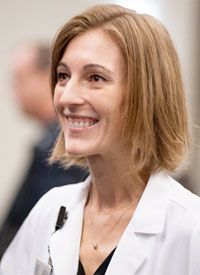IDH2 Inhibition Effective in Early Phase Leukemia Study
The IDH2 inhibitor AG-221 has demonstrated promising response rates in patients with acute myeloid leukemia and other hematologic malignancies.
Courtney DiNardo, MD, assistant professor, leukemia at University of Texas MD Anderson Cancer Center

Courtney DiNardo, MD
The IDH2 inhibitor AG-221 has demonstrated promising response rates in patients with acute myeloid leukemia (AML) and other hematologic malignancies in a phase I study presented at the 20th Congress of the European Hematology Association (EHA).
In the clinical trial, the objective response rate (ORR) with AG-221 was 40% in patients with relapsed or refractory AML and other IDH2-mutant positive advanced hematologic malignancies. The duration of response was more than 15 months at the analysis, and remained ongoing. Overall, 76% of responses lasted longer than 6 months.
“The clinical profile of AG-221 continues to be impressive from the perspectives of response rate, durability, safety and unique mechanism of action,” lead investigator Courtney DiNardo, MD, assistant professor, leukemia at University of Texas MD Anderson Cancer Center, said in a statement. “Additionally, it is encouraging to see early proof-of-concept in myelodysplastic syndrome and untreated acute myeloid leukemia given the need for more effective therapies for these patients.”
In the study, there was a dose escalation portion followed by the enrollment of 100 patients across 4 expansion arms, with 25 patients in each group. The first expansion arm included patients over the age of 60 years with relapsed or refractory AML who were transplantation ineligible. The second arm looked at those with relapsed or refractory AML under age 60. The third arm included those with untreated AML who decided not to receive standard chemotherapy and the final group contained patients with IDH2 mutation positive hematologic malignancies.
Data presented at EHA were from the dose escalation portion and from the 4 expansion cohorts. Across all of the arms, there were 177 patients at a median age of 69 years. Of these patients, 158 were evaluable for efficacy. Doses ranging from 60 mg to 450 mg daily were explored in the study, with a maximum tolerated dose not achieved. In the expansion cohorts, a 100 mg daily dose was utilized.
In patients who responded in the full population, the complete response (CR) rate was 16%. In patients specifically with relapsed or refractory AML, the ORR was 41%, with a CR rate of 18%. In untreated patients with AML, the ORR was 32%, with a CR rate of 14%. In 14 patients enrolled with myelodysplastic syndrome (MDS), 50% experienced a response, including a CR rate of 14%. ORRs also consisted of CRs in the marrow and those with incomplete platelet recovery.
The most frequently reported adverse events were nausea, fatigue, increased blood bilirubin, and diarrhea. These were noted to be mild to moderate in severity. Twenty-seven treatment-related serious adverse events were seen in the study.
The phase I study will continue to recruit patients into a fifth expansion arm that will enroll 125 patients with IDH2 mutation-positive AML who are in second or later relapse, refractory to second-line induction or reinduction treatment, or have relapsed after allogeneic transplantation. Additionally, Agios, the developer of the drug, plans to initiate a phase III study geared toward FDA approval in the second half of 2015 for patients with IDH2-positive relapsed/refractory AML.
IDH2 is a metabolic enzyme commonly mutated in a variety of malignancies. When this enzymes is mutated, it produces alpha-ketoglutarate and 2-hydroxyglutarate, causing abnormal histone and DNA methylation. In patients with AML, the IDH2 mutation was found to occur in 9% to 13% of patients.
Considering the Durability of Zanubrutinib in Relapsed/Refractory CLL
April 11th 2024During a Case-Based Roundtable® event, Marc S. Hoffmann, MD, discussed his viewpoints on the use of Bruton tyrosine kinase inhibitors for patients with relapsed/refractory chronic lymphocytic leukemia and the efficacy behind zanubrutinib in the second article of a 2-part series.
Read More